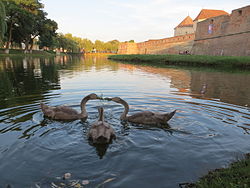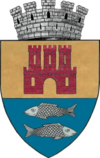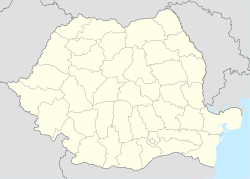Făgăraş
| Făgăraș | ||
|---|---|---|
| Municipality | ||
 |
||
|
||
 Location in Brasov County |
||
| Location of Făgăraș | ||
| Coordinates: 45°50′41″N 24°58′27″E / 45.84472°N 24.97417°ECoordinates: 45°50′41″N 24°58′27″E / 45.84472°N 24.97417°E | ||
| Country |
|
|
| County | Brașov County | |
| Status | Municipality | |
| Government | ||
| • Mayor | Gheorghe Sucaciu | |
| Population (2011) | ||
| • Total | 28,330 | |
| Time zone | EET (UTC+2) | |
| • Summer (DST) | EEST (UTC+3) | |
| Climate | Dfb | |
| Website | www |
|
Făgăraș (Romanian pronunciation: [fəɡəˈraʃ]; German: Fogarasch, Fugreschmarkt, Hungarian: Fogaras) is a city in central Romania, located in Brașov County. It lies on the Olt River and has a population of 28,330 as of 2011. It is situated in the historical region of Transylvania.
In 2011 Romanians formed 91.7% of the population, the main minorities being represented by Romani people, Hungarians and Germans.
According to linguist Iorgu Iordan, the name of the town is a Romanian diminutive of collective noun *făgar ("beech forest"), derived from , "beech tree".
Another source of the name is alleged to derive from the Hungarian language word for "partridge" (fogor). A more plausible explanation is that the name is given by Fogaras river coming from the Pecheneg "Fagar šu", which means ash water. Another source of the name is given by folk etymology to be Hungarian, as the rendering of "wood" (fa) and "money" (garas), with legends stating that money made of wood had been used to pay the peasants who built the fortress (Făgăraș Citadel) around 1310.
Făgăraș, together with Amlaș, constituted during the Middle Ages a traditional Romanian local-autonomy region in Transylvania. The first written document mentioning Romanians in Transylvania referred to Vlach lands ("Terra Blacorum") in the Făgăraș Region in 1222. (In this document, Andrew II of Hungary gave Burzenland and the Cuman territories South of Burzenland up to the Danube to the Teutonic Knights.) After the Tatar invasion in 1241–1242, Saxons settled in the area. In 1369, Louis I of Hungary gave the Royal Estates of Făgăraș to his vassal, Vladislav I of Wallachia. As in other similar cases in medieval Europe (such as Foix, Pokuttia or Dauphiné), the local feudal had to swear oath of allegiance to the king for the specific territory, even when the former was himself an independent ruler of another state. Therefore, the region became the feudal property of the princes of Wallachia, but remained within the Kingdom of Hungary. The territory remained in the possession of Wallachian princes until 1464.
...
Wikipedia


